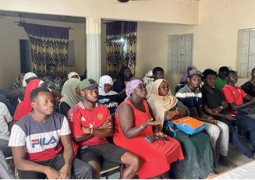
The Gambian-German Advisory Centre for Jobs, Training and Reintegration (GGAC) and the Gambia Technical Training Institute(GTTI) are jointly offering them additional training opportunities to improve their prospects.
These courses are aimed at unemployed young people and returnees who would like to increase their job opportunities. The GGAC and GTTI work closely with the private sector to be in a position to offer the trainees a one-month industrial apprenticeship.
There are for instance courses on offer in solar technology, rural mechanics and civil engineering. This programme enables the young people to gain professional qualifications and thus have a greater chance of finding a job.
The programme will help young people to develop their creativity and the relevant skills.
The vocational training gives participants the skills that are in demand on the job market. It benefits from National Accreditation and Quality Assurance Authority (NAQAA) certification.
The training includes both theoretical and practical lessons. It involves not only technical content, but also basic skills such as reading and arithmetic. The training is followed by an apprenticeship with partners from the private sector. This enables the apprentices to develop and extend their practical and technical abilities.
Once they have successfully completed the training, the young people are given soft-skills training (in entrepreneurship, communication and marketing) and are given help in finding a job.
Meanwhile, to reintegrate the returning migrants and create an alternative to migration for rural youth, The Gambia recently submitted a project proposal to the Global Environment Facility (GEF) to support young people in the country.
The climatic changes associated with the current trend of global warming are set to impact on The Gambia. Young people are taking the initiative to fight and mitigate the root causes of disaster, climate change and use right based approach in tackling the global phenomenon of environmental problems.
The impacts may come in many guises; floods, droughts, massive increase of vector and water borne diseases, rapid desertification and coastal erosion and so on.
Engaging young people to address disaster risk is a critical element to any nation’s strategy and young people are key point of influence for other segments of society.
If citizens come to understand the risks involved and how they can play a role in reducing disaster risk, they can become an integral part of the solution.
The issue of environmental management and improvement should be a major concern to young people and they ought to play active roles in program and activities which improve the environment such as recycling, community clean-ups and land reclamation.
Deforestation in The Gambia has being mainly a consequence of bush fires and the illegal logging of trees. Trees are extensively felled for firewood for commercial and domestic heating or as a raw material for the construction of fences, roofs and boats.





